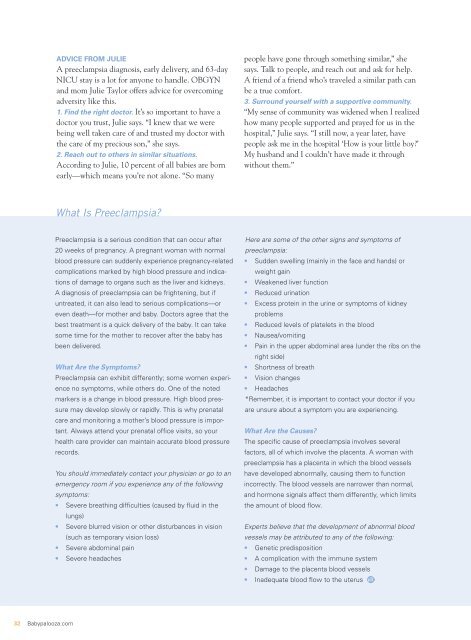Babypalooza Summer 2019
You also want an ePaper? Increase the reach of your titles
YUMPU automatically turns print PDFs into web optimized ePapers that Google loves.
ADVICE FROM JULIE<br />
A preeclampsia diagnosis, early delivery, and 63-day<br />
NICU stay is a lot for anyone to handle. OBGYN<br />
and mom Julie Taylor offers advice for overcoming<br />
adversity like this.<br />
1. Find the right doctor. It’s so important to have a<br />
doctor you trust, Julie says. “I knew that we were<br />
being well taken care of and trusted my doctor with<br />
the care of my precious son,” she says.<br />
2. Reach out to others in similar situations.<br />
According to Julie, 10 percent of all babies are born<br />
early—which means you’re not alone. “So many<br />
people have gone through something similar,” she<br />
says. Talk to people, and reach out and ask for help.<br />
A friend of a friend who’s traveled a similar path can<br />
be a true comfort.<br />
3. Surround yourself with a supportive community.<br />
“My sense of community was widened when I realized<br />
how many people supported and prayed for us in the<br />
hospital,” Julie says. “I still now, a year later, have<br />
people ask me in the hospital ‘How is your little boy?’<br />
My husband and I couldn’t have made it through<br />
without them.”<br />
What Is Preeclampsia?<br />
Preeclampsia is a serious condition that can occur after<br />
20 weeks of pregnancy. A pregnant woman with normal<br />
blood pressure can suddenly experience pregnancy-related<br />
complications marked by high blood pressure and indications<br />
of damage to organs such as the liver and kidneys.<br />
A diagnosis of preeclampsia can be frightening, but if<br />
untreated, it can also lead to serious complications––or<br />
even death––for mother and baby. Doctors agree that the<br />
best treatment is a quick delivery of the baby. It can take<br />
some time for the mother to recover after the baby has<br />
been delivered.<br />
What Are the Symptoms?<br />
Preeclampsia can exhibit differently; some women experience<br />
no symptoms, while others do. One of the noted<br />
markers is a change in blood pressure. High blood pressure<br />
may develop slowly or rapidly. This is why prenatal<br />
care and monitoring a mother’s blood pressure is important.<br />
Always attend your prenatal office visits, so your<br />
health care provider can maintain accurate blood pressure<br />
records.<br />
You should immediately contact your physician or go to an<br />
emergency room if you experience any of the following<br />
symptoms:<br />
• Severe breathing difficulties (caused by fluid in the<br />
lungs)<br />
• Severe blurred vision or other disturbances in vision<br />
(such as temporary vision loss)<br />
• Severe abdominal pain<br />
• Severe headaches<br />
Here are some of the other signs and symptoms of<br />
preeclampsia:<br />
• Sudden swelling (mainly in the face and hands) or<br />
weight gain<br />
• Weakened liver function<br />
• Reduced urination<br />
• Excess protein in the urine or symptoms of kidney<br />
problems<br />
• Reduced levels of platelets in the blood<br />
• Nausea/vomiting<br />
• Pain in the upper abdominal area (under the ribs on the<br />
right side)<br />
• Shortness of breath<br />
• Vision changes<br />
• Headaches<br />
*Remember, it is important to contact your doctor if you<br />
are unsure about a symptom you are experiencing.<br />
What Are the Causes?<br />
The specific cause of preeclampsia involves several<br />
factors, all of which involve the placenta. A woman with<br />
preeclampsia has a placenta in which the blood vessels<br />
have developed abnormally, causing them to function<br />
incorrectly. The blood vessels are narrower than normal,<br />
and hormone signals affect them differently, which limits<br />
the amount of blood flow.<br />
Experts believe that the development of abnormal blood<br />
vessels may be attributed to any of the following:<br />
• Genetic predisposition<br />
• A complication with the immune system<br />
• Damage to the placenta blood vessels<br />
• Inadequate blood flow to the uterus<br />
32 <strong>Babypalooza</strong>.com









